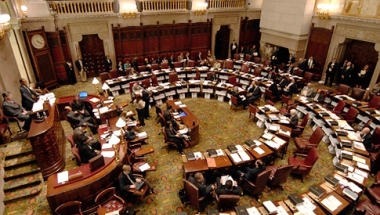Evaluating Recent Legislative Changes

As we look back on the recent legislative changes that have been implemented, it is crucial to evaluate their impact on political reforms. These changes have the potential to shape the future of our political landscape and it is important to analyze whether they are truly effective in bringing about positive change. By closely examining the impact of these legislative changes, we can gain valuable insights into the effectiveness of our political reform efforts.
Furthermore, it is essential to assess the effectiveness of political reforms in light of the insights we have gained in 2024. With a clearer understanding of the current political climate and the challenges we face, we can better evaluate the success of our reform efforts. By taking a critical look at the impact of recent legislative changes and analyzing their effectiveness in light of 2024 insights, we can make informed decisions on how to further improve and strengthen our political system.
Impact of Electoral System Modifications
One key aspect of political reforms is the modification of electoral systems. By enhancing representation through proportional voting systems, we can ensure that all voices are heard and that diverse perspectives are taken into account in decision-making processes. This can lead to a more inclusive and representative government that truly reflects the will of the people.
In addition, implementing ranked choice voting can increase voter engagement and participation in the electoral process. By giving voters more choices and allowing them to rank their preferences, we can encourage greater voter turnout and ensure that the elected officials truly represent the will of the majority. These electoral system modifications can have a significant impact on the effectiveness of political reforms and the overall health of our democracy.
Transparency and Anti-Corruption Measures

Transparency is a crucial component of effective political reforms. By ensuring that government actions are open and accessible to the public, we can build trust and accountability in our political system. Transparency allows citizens to hold their elected officials accountable and to participate more actively in the political process. Without transparency, political reforms are likely to be ineffective and may even be undermined by corruption and lack of accountability.
Furthermore, anti-corruption measures are essential for restoring public trust in government institutions. By implementing strict measures to prevent and punish corruption, we can ensure that our political system is fair and just. Anti-corruption efforts are essential for upholding the integrity of political reforms and for building a government that truly serves the interests of the people.
Role of Civil Society in Reform Advocacy
Civil society plays a crucial role in promoting political reforms through advocacy efforts. By mobilizing citizens and raising awareness about the need for change, civil society organizations can push for meaningful reforms and hold government officials accountable. Collaboration between civil society and government is crucial for ensuring that reforms are implemented effectively and that the voices of the people are heard.
By working together, civil society and government can create a more inclusive and responsive political system that truly serves the needs of the people. Civil society advocacy efforts can help to drive positive change and to ensure that political reforms are implemented in a way that benefits all members of society.
Decentralization and Local Governance
Decentralization promotes local empowerment and decision-making by giving more power to local governments and communities. By devolving authority and resources to the local level, decentralization can ensure that decisions are made closer to the people and that local needs are prioritized. This can lead to more responsive and accountable governance that truly serves the interests of the community.
Local governance is essential for ensuring accountability and responsiveness to community needs. By empowering local governments to make decisions on issues that directly impact their constituents, we can ensure that government is more transparent and accountable. Local governance can also help to build trust between citizens and their elected officials, leading to a more effective and inclusive political system.
Judicial Reforms and Access to Justice
Judicial reforms are essential for ensuring fairness in political processes. By strengthening the independence and integrity of the judiciary, we can ensure that the rule of law is upheld and that all citizens are treated fairly and equally. Judicial reforms can also help to prevent corruption and abuse of power, ensuring that political processes are transparent and accountable.
Access to justice must be improved to uphold political reforms and to ensure that all citizens have equal access to legal remedies. By providing affordable and accessible legal services, we can empower citizens to hold their government accountable and to seek redress for any injustices they may face. Access to justice is a fundamental right that must be protected in order to uphold the principles of democracy and the rule of law.
International Perspectives on Domestic Reforms

Comparing global political reforms can provide valuable insights into the effectiveness of our own reform efforts. By studying international perspectives on political reform, we can learn from the experiences of other countries and adapt best practices to our own context. International perspectives can help us to identify new approaches and strategies for improving our political system and for addressing the challenges we face.
Furthermore, the impact of international perspectives on domestic policies can be significant. By taking into account global trends and best practices, we can ensure that our own reform efforts are aligned with international standards and expectations. This can help to build credibility and trust in our political system, both domestically and internationally. By learning from the experiences of other countries and incorporating international perspectives into our reform efforts, we can strengthen our democracy and build a more inclusive and responsive political system.










